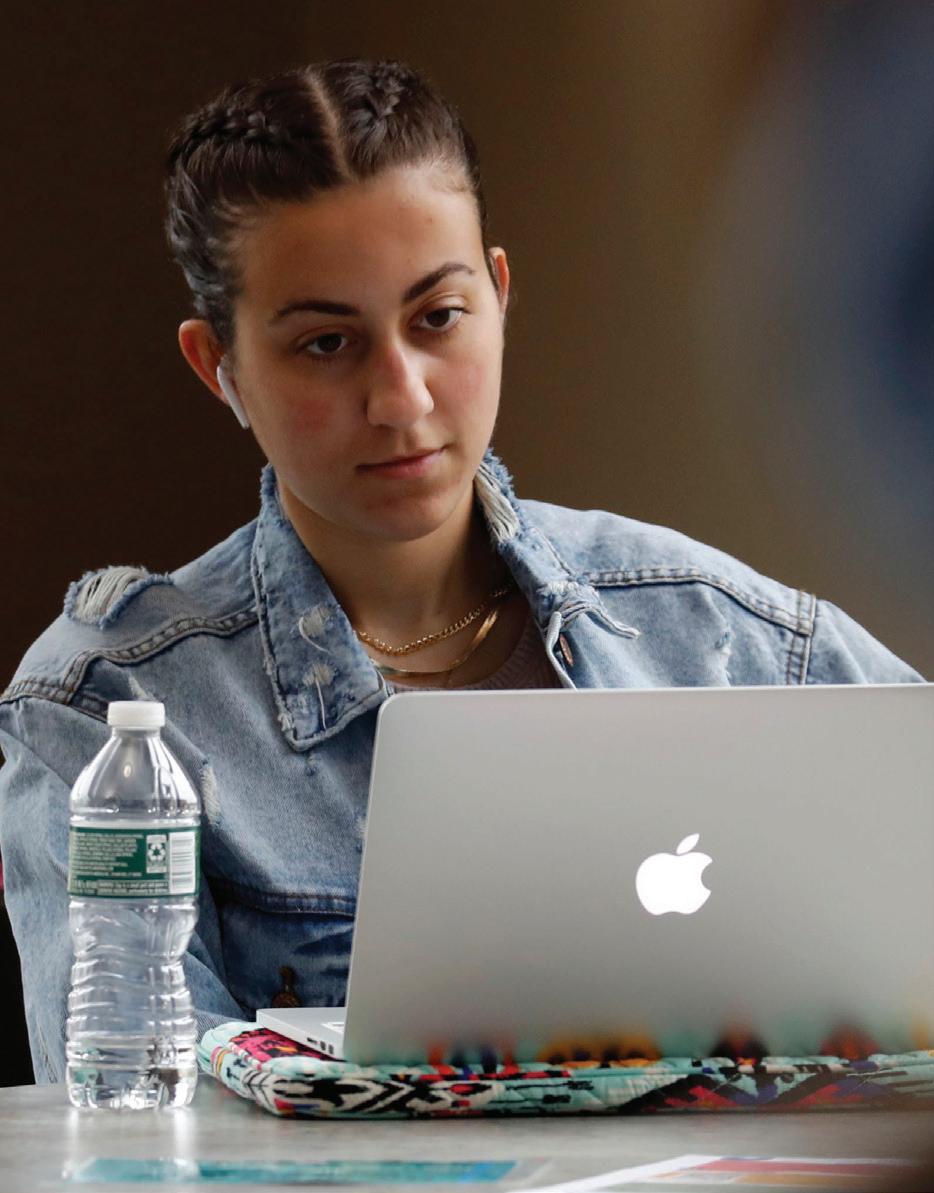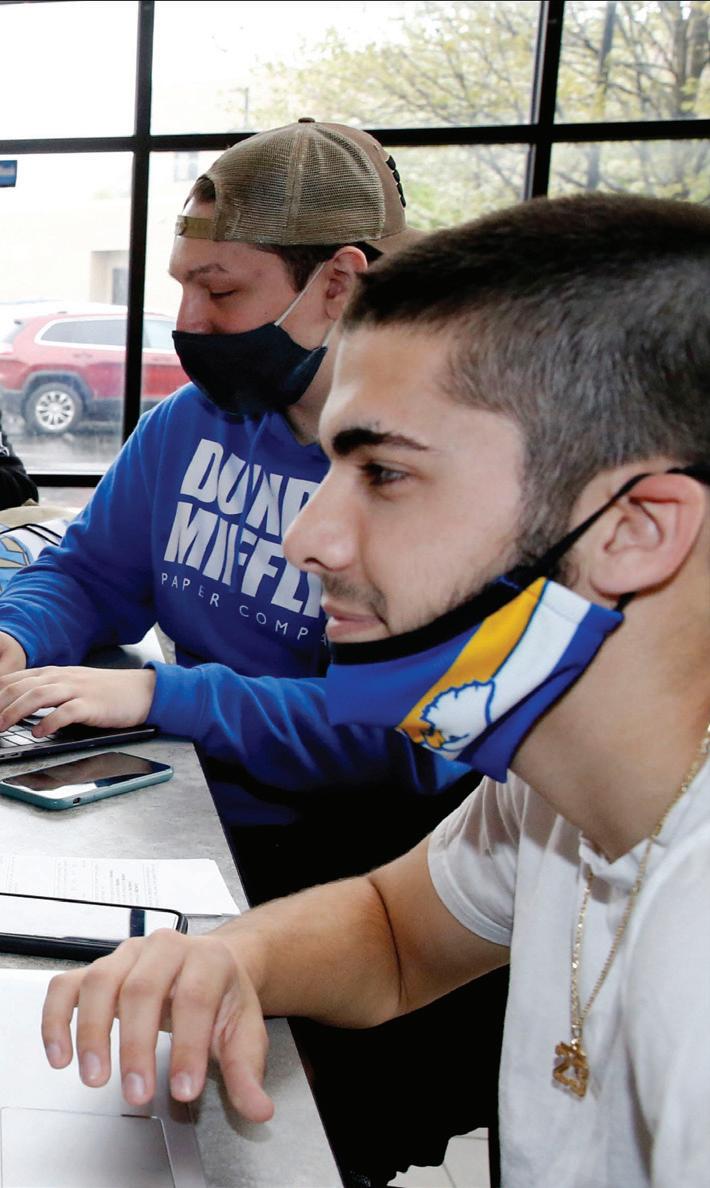
6 minute read
Staff Spotlight
Diedre D . DeBose, Ed .D ., was raised in a family that emphasized the power of knowledge and the value of education . Those touchstones grew into a longing to work in higher education – one she had even as a first-generation college student.
Today she brings to her role as director of diversity, equity, and inclusion at Hilbert College – one she started at the end of April – the expertise of a long career in education advocating for students and the programs that can help them succeed . “There are some fields that you go into where you feel that it’s a calling, and the role I’m in now is completely, one hundred percent, authentically me,” Dr . DeBose said . After receiving her MSW from SUNY Buffalo, she began a career in social work . In this field, building relationships to assist and empower people became a foundation for her later work in opportunity programs, and the diversity work she does today .
Advertisement
Diedre’s career path in higher education is one that is marked by the type of growth that translates to metrics in student success: while assistant director in the Canisius College Higher Education Opportunity Program (HEOP) & Dr . Martin Luther King Jr . Leadership Program, program enrollment for underrepresented – or, more accurately, ‘historically excluded’ – students increased by more than 20% . Her work included minimizing barriers for those students while also building partnerships with the college’s deans, the vice presidents of student and academic affairs, the chief diversity officer, and constituents throughout the campus and community .

As director of the McNair Scholars Program for underrepresented STEM students at SUNY Geneseo, she wrote the grant that secured $1 million for the program. Ninetyeight percent of McNair program participants were accepted into graduate or medical school . While she was the college’s director of Access and Equality Opportunity Programs, student retention for underrepresented students increased from 71% to 89% . More than 300 students moved through Geneseo’s HEOP programs during her time .
To this considerable expertise, Diedre brings personal understanding, as a woman of color who as a student was an Equal Opportunity Program recipient .
Her success in leading HEOP programs is the type of growth she hopes to replicate at Hilbert College . (Hilbert College participates in three opportunity programs which recruit, support, and work to retain underrepresented students: Say Yes to Education, Hilbert College Assisi Scholars Program, and the Arthur O . Eve HEOP .) Dr . DeBose has been on a listening tour since joining the staff at the end of April to find out how her skillset can best be of service to all facets of campus and academic life .
“It is really important to take your time to get a sense of a culture, to understand what it is and how the systems flow,” she said.
Dr . DeBose is pragmatic that the eventual culture shifts will mean a significant educational component for students, faculty, and staff . She is starting with helping people connect with her and understand the role of ‘director of diversity, equity, and inclusion’ . It is a challenging job anywhere to change a culture to one that truly reflects diversity, equity, and inclusion (DEI), but she confidently says it happens when everyone involved is willing to stretch, grow, and learn .
Hilbert College’s Franciscan values – which resonate deeply with Diedre both as a rule and as a graduate of a Catholic high school – position the campus community to respond well . The ‘belonging’ concept central to these values will, she believes, underpin the relationship-building required to do this work . It is in this spirit that DEI work is a path to finding barriers, particularly those faced by students of color, and removing them .
“My goal as a leader is to model the way, inspire a shared vision, challenge the process, enable others to act, and, importantly, to encourage the heart,” Diedre said, referencing James Kouzes’ and Barry Posner’s “Five Practices of Exemplary Leadership Model .” She is poised to be a transformational leader in ensuring that diversity, equity, and inclusion are embedded into all facets of the Hilbert community .

Her listening tour is the first stop. Next come plans for campus wide trainings, roundtable discussions, and workshops for faculty, staff, and students . Topics will include implicit bias training, revisiting the results of a past cultural climate survey, and fielding an updated survey.
These conversations will be an opportunity to create honest relationships, Diedre said . The students will be key in these conversations .
“I keep going back to relationship because students are not just going to show up and tell me what they need unless I have that rapport,” she

said . “They are the engine of change and the driving force; it will be about finding that connection with them, so they trust me enough to listen . ”
Simultaneously, she will lead an internal review of policies and procedures, curriculums (“a huge piece,” she says), and hiring practices . For the latter, hiring, the focus will be on ensuring the policy’s practices promote diversity, inclusion and are mission driven .
Hiring more diverse, qualified faculty and staff dovetails with one longterm goal Diedre has for Hilbert College: to create a college-wide mentoring program .
In mentoring (the topic of her dissertation), she said it is not only the quality of the relationships that students have with faculty and staff that makes the difference .
“The findings in my research indicate that same-race mentors are significant to the academic success of African American students attending a predominantly white institution – a place where being an underrepresented student can be challenging to navigate,” she said . Students feel that having a mentor who has similar qualities as themselves is important .
Short Term Goals:
1 . Cultivate and sustain a diverse, equitable, and inclusive campus environment .
2 . Collaborate and develop programs and services to enhance DEI . 3. Increase on-campus representation of historically underrepresented groups . 4. Ensure policies and procedures foster a college-wide commitment to DEI. 5 . Create a community that respects and appreciates the dignity and uniqueness of all . 6 . Minimize barriers for underrepresented students . 7 . Ensure Hilbert has appropriate exposure of topics of diversity throughout the curriculum .
Diedre’s earliest work at Hilbert College included emails she personally wrote and shared with the faculty and staff to acknowledge a day of remembrance in the killing of George Floyd and to commemorate the beginning of Pride month in June . Both emails invoked the important role Franciscan tradition plays in fostering hope, understanding, peace and belonging .
While the Hilbert College DEI work begins by uncovering systemic barriers to student success, the goal is a culture and policies that prevent barriers from manifesting again .
“It’s not about me . It is about the institution,” Diedre said . “It is about our students feeling comfortable and welcome . ”
The role of director of diversity, equity, and inclusion at Hilbert College is funded by a grant from the Mother Cabrini Health Foundation . Please read our Winter 2021 issue, available online, for more about the Foundation funding received by Hilbert College .
Are you interested in being part of Dr . DeBose’s listening tour or learning more about the Hilbert College Office of Diversity, Equity and Inclusion?
Contact her at 716-926-8816 or at ddebose@hilbert.edu. Find out more about DEI at Hilbert at https://www.hilbert.edu/student-life/diversity-inclusion.










